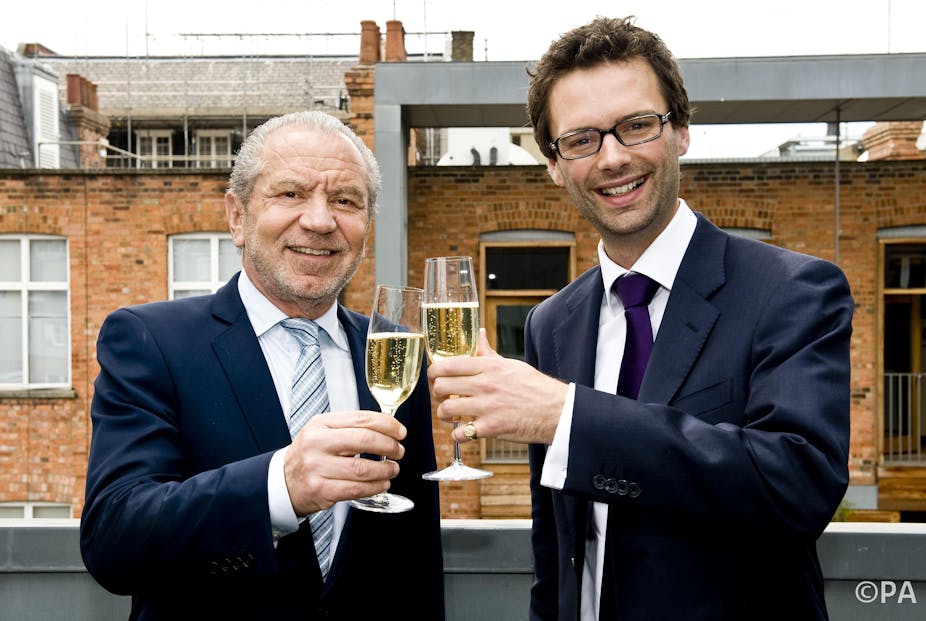An alien watching The Apprentice might be forgiven for thinking all that was needed to be a successful entrepreneur was a sharp suit, a few snappy lines and an ability to blame your colleagues for everything. But there’s a lot more to it than that.
With Lord Sugar investing £250,000 in the business proposed by the winner of tonight’s final, the stakes are high. They’re even higher in the real world though, where entrepreneurs must demonstrate they have both the right business model and the right personal characteristics to impress investors.
Before academia I spent my career on both sides of the boardroom: first a venture capitalist, providing new firms with funding in return for a share of ownership and second as an entrepreneur responsible for starting up new businesses.
So what can The Apprentice tell us? Well, the sharp-suited storytellers are certainly great at pitching an idea, but these aren’t necessarily the people to grow a business in the longer term. Real investors think beyond the series finale.
Selling the story
Entrepreneurs often embark on high risk ventures that can generate high returns. These businesses need money to get going and often this involves several rounds of fundraising over a number of years. This requires the entrepreneur to be able sell their story, vision and mission.
Positive news flow is important to raise the appetite of new investors or, if on a public market, to stimulate demand over supply to generate share price increases. So entrepreneurs need to pitch and often spend weeks meeting potential investors to raise a multi million round of finance. This requires a very different skill set to building and running a business.
Practising the perfect pitch many times over many days will pay off, as long as the vision and belief are still maintained. I was raising investment in the City a few years ago and after many meetings my colleague, an eminent scientist, said to me “I am fed up of presenting the science - I will present the business case and let you present the science for this next pitch”. I asked, “what happens if I get a really difficult science question?” He replied, “That is easy, just say, that question is simple, even my business partner can answer that and pass it back to me!”
So the entrepreneur has to be a story teller, a convincer, a believer in changing intangible hope in to tangible enterprise value.
Business building
But storytelling alone is not enough; once the money is in the bank the successful entrepreneur must actually build their business. This requires perseverance, tenacity, innovation and creativity. Often the business plan is out of date within the first month and the entrepreneur needs to be able to adjust and build while still keeping all stakeholders happy.
And these adjustments have to happen fast. Once, the day after raising a substantial sum of money, I found myself ordering stationery, recruiting a secretary, learning how to cut and paste myself (my PAs used to do it) and how to use and abuse the coffee machine. I moved from having two assistants looking after me to having my own keys to my own two desk office. In the entrepreneurial world, successful people will always look for solutions rather than problems, and rolling your sleeves up and getting on with creating new opportunities is the name of the game.
Tools for The Apprentice
I know some venture capitalists that say they can pick winners, and others that will accept that they can’t win them all. After all, failure can be an asset, if the right lessons are learned. Indeed in the US measured risk taking is valued among entrepreneurs, however in Europe failure still carries more of a stigma.
There is no magic formula that guarantees any businessman or woman will be a success, but there are of course certain traits associated with success. The entrepreneur needs a toolkit that involves all the skills mentioned above combined with the traditional business school subjects - finance, marketing, strategy.
He or she needs be a chameleon not even day to day, but minute to minute, as the environment changes so rapidly and so many balls must be kept up in the air. Our entrepreneur must communicate with people at all levels, often going through a range of emotions in one day, from despair to elation, from disappointment to outright joy - a rollercoaster of a journey.
We still have lots to learn around entrepreneurship. And The Apprentice is certainly stimulating that discussion. A better understanding of what makes a good entrepreneur is crucial if we are to become a nation of innovators that can commercialise and monetise ideas, and generate a culture where the entrepreneurial mindset is accepted and encouraged.

